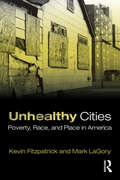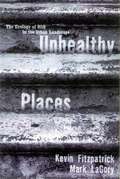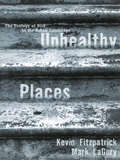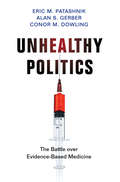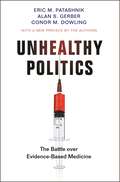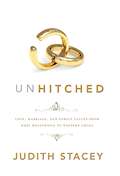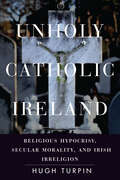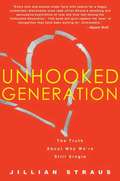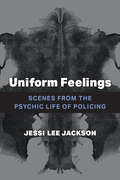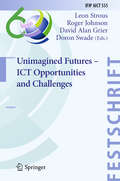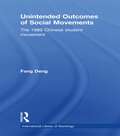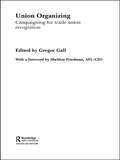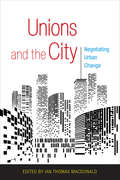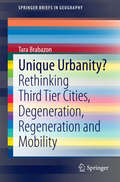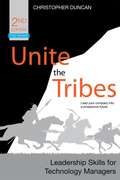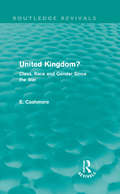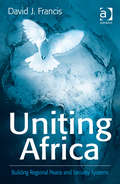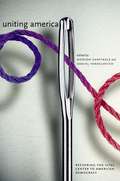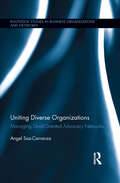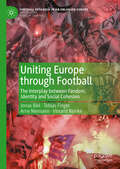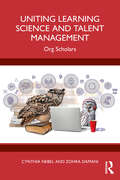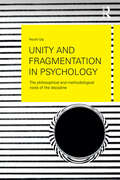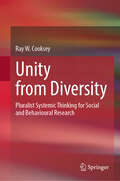- Table View
- List View
Ungleichheit, Individualisierung, Lebenslauf: Zur Aktualität Peter A. Bergers (Sozialstrukturanalyse)
by Rasmus Hoffmann André Knabe Christian SchmittZur Ehrung des 2018 verstorbenen Peter A. Berger werden die Wirkungsgeschichte und die heutige Bedeutung seiner soziologischen Arbeiten dargestellt. Dabei kommen ehemalige KollegInnen zu Wort, die ihre jeweils eigenen Schlussfolgerungen und von Peter A. Berger beeinflussten Arbeitsgebiete der Sozialstrukturanalyse sowie neue Forschungsergebnisse vorstellen. Das Buch dient sowohl dem Kennenlernen der Soziologie Peter A. Bergers, als auch der Einordnung seines Wirkens in die Soziologie sozialer Ungleichheit. Es spannt den Bogen zwischen Bergers wirken, der Bedeutung seiner Arbeiten für die deutsche Sozialstrukturanalyse und der sich daraus ableitenden Bedeutung für aktuelle und zukünftige Forschung in dieser Disziplin.
Unhealthy Cities: Poverty, Race, and Place in America
by Kevin Fitzpatrick Mark LaGoryThe purpose of this book is to show the important role that space and place plays in the health of urban residents, particularly those living in high poverty ghettos. The book brings together research and writing from a variety of disciplines to demonstrate the health costs of being poor in America’s cities. Both authors are committed to raising awareness of structural factors that promote poverty and injustice in a society that proclaims its commitment to equality of opportunity. Our health is often dramatically affected by where we live; some parts of the city seem to be designed to make people sick. The book is intended for students and professionals in urban sociology, medical sociology, public health, and community planning.
Unhealthy Places: The Ecology of Risk in the Urban Landscape
by Kevin Fitzpatrick Mark LagoryAn awakening argument on modern day health hazards and how they are directly proportional to the unhealthiness of urban environment.
Unhealthy Places: The Ecology of Risk in the Urban Landscape
by Kevin Fitzpatrick Mark LaGoryFirst Published in 2000. Routledge is an imprint of Taylor & Francis, an informa company.
Unhealthy Politics: The Battle over Evidence-Based Medicine
by Eric M. Patashnik Alan S. Gerber Conor M. DowlingHow partisanship, polarization, and medical authority stand in the way of evidence-based medicineThe U.S. medical system is touted as the most advanced in the world, yet many common treatments are not based on sound science. Treatments can go into widespread use before they are rigorously evaluated, and every year patients are harmed because they receive too many procedures—and too few treatments that really work. Unhealthy Politics sheds new light on why the government’s response to this troubling situation has been so inadequate, and why efforts to improve the evidence base of U.S. medicine continue to cause so much political controversy and public trepidation.This critically important book draws on public opinion surveys, physician surveys, case studies, and political science models to explain how political incentives, polarization, and the misuse of professional authority have undermined efforts to tackle the medical evidence problem and curb wasteful spending. It paints a portrait of a medical industry with vast influence over which procedures and treatments get adopted, and a public burdened by the rising costs of health care yet fearful of going against “doctor’s orders.” The book shows how the government’s efforts to promote evidence-based medicine have become mired in partisan debates. It also proposes sensible solutions that can lead to better, more efficient health care for all of us.Unhealthy Politics offers vital insights not only into health policy but also into the limits of science, expertise, and professionalism as political foundations for pragmatic problem solving in American democracy.
Unhealthy Politics: The Battle over Evidence-Based Medicine
by Eric M. Patashnik Alan S. Gerber Conor M. DowlingHow partisanship, polarization, and medical authority stand in the way of evidence-based medicineThe U.S. medical system is touted as the most advanced in the world, yet many common treatments are not based on sound science. Unhealthy Politics sheds new light on why the government's response to this troubling situation has been so inadequate, and why efforts to improve the evidence base of U.S. medicine continue to cause so much political controversy. This critically important book paints a portrait of a medical industry with vast influence over which procedures and treatments get adopted, and a public burdened by the rising costs of health care yet fearful of going against "doctor's orders." Now with a new preface by the authors, Unhealthy Politics offers vital insights into the limits of science, expertise, and professionalism in American politics.
Unhitched: Love, Marriage, and Family Values from West Hollywood to Western China (NYU Series in Social and Cultural Analysis #7)
by Judith StaceyJudith Stacey, 2012 winner of the Simon and Gagnon Lifetime Achievement Award presented by the American Sociological Association.A leading expert on the family explores varieties of love and counters the one-size-fits-all vision of family valuesA leading expert on the family, Judith Stacey is known for her provocative research on mainstream issues. Finding herself impatient with increasingly calcified positions taken in the interminable wars over same-sex marriage, divorce, fatherlessness, marital fidelity, and the like, she struck out to profile unfamiliar cultures of contemporary love, marriage, and family values from around the world.Built on bracing original research that spans gay men’s intimacies and parenting in America to plural and non-marital forms of family in South Africa and China, Unhitched decouples the taken for granted relationships between love, marriage, and parenthood. Countering the one-size-fits-all vision of family values, Stacey offers readers a lively, in-person introduction to these less familiar varieties of intimacy and family and to the social, political, and economic conditions that buttress and batter them.Through compelling stories of real families navigating inescapable personal and political trade-offs between desire and domesticity, the book undermines popular convictions about family, gender, and sexuality held on the left, right, and center. Taking on prejudices of both conservatives and feminists, Unhitched poses a powerful empirical challenge to the belief that the nuclear family—whether straight or gay—is the single, best way to meet our needs for intimacy and care. Stacey calls on citizens and policy-makers to make their peace with the fact that family diversity is here to stay.
Unholy Catholic Ireland: Religious Hypocrisy, Secular Morality, and Irish Irreligion (Spiritual Phenomena)
by Hugh TurpinThere are few instances of a contemporary Western European society more firmly welded to religion than Ireland is to Catholicism. For much of the twentieth century, to be considered a good Irish citizen was to be seen as a good and observant Catholic. Today, the opposite may increasingly be the case. The Irish Catholic Church, once a spiritual institution beyond question, is not only losing influence and relevance; in the eyes of many, it has become something utterly desacralized. In this book, Hugh Turpin offers an innovative and in-depth account of the nature and emergence of "ex-Catholicism"—a new model of the good, and secular, Irish person that is being rapidly adopted in Irish society. Using rich quantitative and qualitative research methods, Turpin explains the emergence and character of religious rejection in the Republic. He examines how numerous factors—including economic growth, social liberalization, attenuated domestic religious socialization, the institutional scandals and moral collapse of the Church, and the Church's lingering influence in social institutions and laws—have interacted to produce a rapid growth in ex-Catholicism. By tracing the frictions within and between practicing Catholics, cultural Catholics, and ex-Catholics in a period of profound cultural change and moral reckoning, Turpin shows how deeply the meanings of being religious or non-religious have changed in the country once described as "Holy Catholic Ireland."
Unhooked Generation: The Truth About Why We're Still Single
by Jillian Straus"If every man and woman under 40 who is not in a happy, committed relationship reads Jillian Straus's shocking, heartbreaking, and persuasive exploration of love among the Unhooked Generation, far fewer romances will end in tears. This book will give readers the aha! of recognition they have been waiting for. Unmissable." --Naomi WolfUnhooked Generation is about single men and women in their 20s and 30s who are having unprecedented difficulties finding love. Based on 100 in-depth interviews, Jillian Straus examines the obstacles facing unattached women and men in an age when all the choices we have, somehow, manage to decrease our chances of finding a mate.While cell phones, text messages, e-mail, BlackBerries, speed dating, and internet dating all conspire to create a sense that there are endless options, a culture of "consumer sex" and casual hook-ups make settling down feel like settling. And as the age of first marriage goes up, the level of expectation climbs right along with it, and we start subjecting prospective mates to "the checklist." From the collapse of courtship and the death of romance to the overriding media message that single life is sexy and married life is boring, we have a culture of mixed emotions about the very concept of marriage.Confronted by a host of factors that other generations never considered in their search for love and commitment, the "unhooked generation" faces a potholed road to romance. Rich with compelling personal stories, and leavened with wit and sharp observation, this is a book that clarifies this confusing, compelling issue as no other book has--and in its final chapter offers concrete advice for addressing the problem.
Uniform Feelings: Scenes from the Psychic Life of Policing
by Jessi Lee JacksonIn Uniform Feelings, American studies scholar and abolitionist psychotherapist Jessi Lee Jackson reads policing as a set of emotional and relational practices in order to shed light on the persistence of police violence. Jackson argues that psychological investments in U.S. police power emerge at various sites: her counseling room, manuals for addressing bias, museum displays, mortality statistics, and memorial walls honoring fallen officers. Drawing on queer, feminist, anticolonial, and Black engagements with psychoanalysis to think through U.S. policing—and bringing together a mix of clinical case studies, autotheory, and ethnographic research—the book moves from the individual to the institutional. Jackson begins with her work as a psychotherapist working across the spectrum of relationships to policing, and then turns to interrogate carceral psychology—the involvement of her profession in ongoing state violence. Jackson orbits around two key questions: how are our relationships shaped by proximity to state violence, and how can our social worlds be transformed to challenge state-sanctioned violence?
Unimagined Futures – ICT Opportunities and Challenges (IFIP Advances in Information and Communication Technology #555)
by David Alan Grier Roger Johnson Leon Strous Doron SwadeThis Festschrift, Unimagined Futures – ICT Opportunities and Challenges, is the first Festschrift in the IFIP AICT series. It examines key challenges facing the ICT community today. While addressing the contemporary challenges, the book provides the opportunity to look back to help understand the contemporary scene and identify appropriate future responses to them. Experts in different areas of the ICT scene have contributed to this IFIP 60th anniversary book, which will be a key input to the ICT community worldwide on setting policy priorities and agendas for the coming decade. In addition, a number of contributions look specifically at the role of professionals and of national, regional, and global organizations in disseminating the benefits of ICT to humanity worldwide.
Uninsured in Chicago: How the Social Safety Net Leaves Latinos Behind (Latina/o Sociology #14)
by Robert VargasWhy millions of Latinx people don’t access the healthcare system, even in times of needMore than a decade after the passage of the Affordable Care Act, around eleven million Latinx citizens around the country remain uninsured. In Uninsured in Chicago, Robert Vargas explores the roots of this crisis, showing us why, despite their eligibility, Latinx people are the racial group least likely to enroll in health insurance. Following the lives of forty uninsured Latinx people in Chicago, Vargas provides an up-close look at America’s broken healthcare system, and how it impacts marginalized groups. From excruciatingly long waits and expensive medical bills, to humiliating interactions with health navigators and emergency room staff, he shows us why millions of Latinx people avoid the healthcare system, even in times of need. With a compassionate eye, Vargas highlights the unique struggles Latinx people face as the largest racial group without health insurance in the United States. An intimate account of the lives of uninsured Latinos, this book imagines new, powerful ways to strengthen our social safety net to better serve our most vulnerable communities.
Unintended Outcomes of Social Movements: The 1989 Chinese Student Movement (International Library of Sociology)
by Fang DengWhy did the 1989 Chinese student movement end in violent confrontation at Tiananmen Square, despite the fact that both the Chinese government and the students very much wanted to avoid violence? This puzzle, which lies at the heart of the tragic events at Tiananmen, is addressed here from a fresh perspective that sheds new insight into these dramatic events. Throughout Unintended Outcomes in Social Movements, Deng applies the formal methods of game theory to elucidate some of the contingent, strategic decision-making by both sides in a social-movement/state confrontation, and how those decisions can – and did - lead to an unintended outcome. In identifying the necessary cause of the Tiananmen tragedy, namely a newly created social system with four highly specific properties, this book provides the first adequate explanation of the Tiananmen events. Because of this, it stands to make a significant stride toward convincing students of political conflict of the explanatory power of formal game-theoretic models. This book is an excellent source of reference for both undergraduate and postgraduate students in areas including Chinese politics, social movements, game theory economics, and social theory.
Union Organizing: Campaigning for Trade Union Recognition (Routledge Studies in Employment Relations)
by Gregor GallAfter many years of indifferent decline, trade union membership is now being revitalized; strategies known as ‘union organizing’ are being used to recruit and re-energize unions around the globe. This book considers exactly how trade unions are working to do this and provides a much-needed evaluation of these rebuilding strategies. By comparing historical and contemporary case studies to assess the impact of various organizing campaigns, this book assesses the progress of unions across Europe and America. It raises key debates about the organizing culture and considers the impact of recent union recognition laws on employers and the government's Fairness at Work policy.A topical and in-depth study into the experiences of trade unions across Europe and America, this is a comprehensive and thought provoking book which is essential reading for those in the industrial relations field.
Unions and the City: Negotiating Urban Change
by Ian Thomas MacDonaldLabor unions remain the largest membership-based organizations in major North American cities, even after years of decline. Labor continues to play a vital role in mobilizing urban residents, shaping urban conflict, and crafting the policies and regulations that are transforming our urban spaces. As unions become more involved in the daily life of the city, they find themselves confronting the familiar dilemma of how to fold union priorities into broader campaigns that address nonunion workers and the lives of union members beyond the workplace. If we are right to believe that the future of the labor movement is an urban one, union activists and staffers, urban policymakers, elected officials, and members of the public alike will require a fuller understanding of what impels unions to become involved in urban policy issues, what dilemmas structure the choices unions make, and what impact unions have on the lives of urban residents, beyond their members.Unions and the City serves as a road map toward both a stronger labor movement and a socially just urbanism. The book presents the findings of a collaborative project in which a team of labor researchers and labor geographers based in New York City and Toronto investigated how and why labor unions were becoming more involved in urban regulation and urban planning. The contributors assess the effectiveness of this involvement in terms of labor goals—such as protecting employment levels, retaining bargaining relationships with employers, and organizing new workforces—as well as broader social consequences of union strategies, such as expanding access to public services, improving employment equity, and making neighborhoods more affordable. Focusing on four key economic sectors (film, hospitality, green energy, and child care), this book reveals that unions can exert a surprising level of influence in various aspects of urban policymaking and that they can have a significant impact on how cities are changing and on the experiences of urban residents.ContributorsSimon Black, Brock University; Maria Figueroa, Cornell University; Lois S. Gray, Cornell University; Ian Thomas MacDonald, University of Montreal; James Nugent, University of Toronto; Susanna F. Schaller, City College Center for Worker Education; Steven Tufts, York University; K. C. Wagner, Cornell University; Mildred Warner, Cornell University; Thorben Wieditz, York University
Unique Urbanity?
by Tara BrabazonThis book investigates small cities - cities and towns that are not well known or internationally branded, but are facing structural economic and social issues after the Global Financial Crisis. They need to invent, develop and manage new reasons for their existence. The strengths and opportunities are often underplayed when compared to larger cities. These small cities do not have the profile of New York, London, Tokyo or Cairo, or second-tier cities like San Francisco, Manchester, Osaka or Alexandria. This book traces the current state of the creative industries literature after the GFC, but with a specific focus. The specific - and worsening - conditions in third-tier cities are logged. The social and economic challenges within these regions are great, particularly with regard to health and health services, education, employment, social mobility and physical activity. This is not a study that merely diagnoses problems but raises strategies for third-tier cities to create both a profile and growth. The current research field is synthesized to reveal how cities are defined, constituted, developed and, in many cases, suffering decline. There is an imperative to build relationships with other urban environments. The book enters these under-discussed locations and reveal the scarred layering of injustice, signified by depopulation, dis-investment, economic decline and a reduction in public services for health, transportation and education, while also developing specific and innovative models for improvement. The vista summoned in Unique Urbanity is international, with strong attention to trans-local strategies that offer wide relevance, currency and opportunities for policy makers. While third-tier cities are often hidden, marginalized, invisible or demeaned, Unique Urbanity shows that innovation, imagination and creativity can emerge in small places.
Unite The Tribes
by Christopher DuncanEvery day, customers see the results of companies where fiefdoms have formed and silos create divisional or departmental strife: poor sales and profits, and lackluster products. It's not hard to see that such companies are headed for an early grave. Regardless of the manner in which company fractures manifest themselves, tech leaders must find a way to rid their workplaces of the divisions that threaten to undermine their company's productivity, profits, and survival. That's why, in Unite the Tribes: Leadership Skills for Technology Managers, Christopher Duncan, bestselling author of The Career Programmer, provides corporate leaders with a ten-point plan for joining their company's divided ranks together in a way that helps employees achieve their goals while also accomplishing those of the company. Using the metaphors of the company as empire and the groups that form within companies as tribes, Duncan explains that the formation of tribes within an empire is unavoidable. After all, regardless of the situation in which they find themselves, human beings are social creatures who align themselves with those whose goals and motivations match their own. That's why the accountants hang together in the break room, while developers talk shop and geek culture in a watering hole down the street. Yet the job of leaders is to build a cohesive, powerful, and enduring empire by bringing all groups together in service to a shared, inspiring mission. And that goes double for tech companies, where breakthroughs create new landscapes on a daily basis. In Unite the Tribes, you will learn: How to build alliances and a spirit of unity across all levels of the company to achieve higher employee morale, greater profits, and increased productivity. How to come up with strategies that win market share as well as the hearts and minds of your employees. How to manage conflict. Why self-interest rules the day and how knowing another's wants and needs helps you achieve goals of your own. Unite the Tribes will show you, the visionary leader, how to establish an empire by convincing your tribes of a simple but crucial truth: Alone, you are weak and vulnerable. United, you are invincible. What you'll learn Readers of Unite the Tribes will learn: Practical, down-to-earth approaches to problem solving and productivity that make sense to corporate leaders who have to do real work in the real world. How to arrive at a plan for uniting the disparate groups that operate within their company when faced with the daily reality of office politics, maneuvering, ambition, incompetence, and short-term thinking. How to convey the company's purpose to employees in a way that is realistic and meaningful so that all workers can contribute to the company's greater good. Who this book is for Those serving in leadership or managerial capacities (i. e. , those overseeing one or more employees) at technology companies plagued with division and dysfunction will find the solutions they need to rally their employees to join forces in Unite the Tribes. In addition, leaders and managers of companies whose cohesion is still healthy yet is being threatened with fracture will be provided with real-world strategies for reinforcing the glue that holds their company together in this practical, applications-driven guide. Table of Contents The Myth of Absolute Power Building the Future A Lasting Empire Vision Leadership Organization Mobility Competitiveness Persuasion Strategy Brilliance Morale Unite
United Kingdom?: Class, Race and Gender since the War (Routledge Revivals)
by E. CashmoreFirst published in 1989, United Kingdom? examines the three main divisions in British society in the post-war period: class, race and gender. During the 1980s there was an increasing concern about deep, and often bitter, divisions in British society. Events such as the miners’ strike of 1984-5, the riots in Handsworth, Tottenham and Brixton, and the women’s peace camp at Greenham Common all demonstrated the opposing views and cultures of the British public. However, the UK at the time was also able to show remarkable and continuing stability in other areas. This book considers to what extent the United Kingdom really was a kingdom united from the post-war period to the late 1980s. It focuses on issues of cohesion and conflict and debates the security of essential social stability.
Uniting Africa: Building Regional Peace and Security Systems
by David J. FrancisPlagued by bloody wars and armed conflicts, political instability, communal violence and displaced persons, and at the mercy of natural catastrophes such as drought and famine, it is not surprising that the Western press has long dismissed Africa as the 'hopeless continent'. In the face of these challenges, Africa today is faced with a stark choice: either unite or perish. The debate on why and how the continent should unite in terms of co-operative peace, security and development is more urgent than at any other time in Africa's post-colonial history. Moving forward from the failure of the earlier, typically idealistic Africa unity project, David Francis demonstrates how peace and security challenges have created the imperative for change. He argues that a series of regional peace and security systems are emerging, and that states that have participated in practical experiments in regional peacekeeping, peace support operations, conflict stabilization/management and preventive diplomacy are building de facto systems of peace and security that could be institutionalized and extended.
Uniting America: Restoring the Vital Center to American Democracy
by Daniel Yankelovich Norton GarfinkleIn Uniting America, some of the country's most prominent social thinkers-among them Francis Fukuyama, Daniel Yankelovich, Amitai Etzioni, Alan Wolfe, Uwe Reinhardt, and Thomas E. Mann-reject the myth of polarization. On topics ranging from the war on terrorism, health care, economic policy, and Social Security to religion, diversity, and immigration, the authors argue that there are sensible, centrist solutions that are more in keeping with prevailing public sentiment and that would better serve the national interest. On issue after issue, the authors show how the conventional framing of the debate in Washington has misled Americans, creating a series of false dilemmas and forcing choices between two extremes-at the expense of more balanced and pragmatic policy solutions based on enduring American values. Uniting America provides a blueprint for a fresh approach to American politics, grounded in moderation, pragmatism, and the shared values that unite Americans.
Uniting Diverse Organizations: Managing Goal-Oriented Advocacy Networks (Routledge Studies in Business Organizations and Networks)
by Angel Saz-CarranzaNetworks are made up of organizations. Often a central unit, or "Network Administrative Organization" (NAO), manages an entire network of organizations that collaborate to achieve an overall network-level goal. Goal-directed networks are those that come together to achieve a shared objective, in addition to the individual organization-specific goals. This book’s focus is on the management of goal-directed networks. Despite the fact that formalized goal-directed interorganizational networks have become extremely popular in the public and nonprofit sectors, as many social problems require concerted action, publications on managing goal-directed networks do not exist. In this book, author Angel Saz-Carranza examines four networks that differ by size, scope, and geographical location. He offers a novel and innovative framework focusing on networks’ inherent internal tensions between unity and diversity, paralleling the differentiation/integration tension found in organization theory, which has not previously been applied to interorganizational networks.
Uniting Europe through Football: The Interplay between Fandom, Identity and Social Cohesion (Football Research in an Enlarged Europe)
by Arne Niemann Jonas Biel Tobias Finger Vincent ReinkeThe book explores how football fandom as a leisure and lifeworld activity can contribute to strengthening identification with and social cohesion in Europe. Based on the three-year research project &“FANZinE&” (Football as the basis for social cohesion in Europe), financed by the German Federal Ministry of Education and Research (BMBF), the book allows readers to understand the intersection and causal interaction between football fandom, European identities, and social cohesion in Europe, using four European countries Germany, Norway, Poland, and Spain. This book is aimed at those engaged in football and broader sport research, European Studies, as well as identity and social cohesion research. It will also be of interest to advanced students in the fields of Political Science, International Relations, European Studies, Sports Studies, and Sociology.
Uniting Learning Science and Talent Management: Org Scholars
by Cynthia Nebel Zohra DamaniThis book delves into the intricate relationship between the talent lifecycle and learning science, offering a fresh perspective on talent management. Through a meticulous exploration of talent acquisition, management, retention, and exits, it reveals how learning science can be harnessed to enhance organizational growth and employee satisfaction.Covering strategic talent sourcing, optimized onboarding, leadership development, and innovative retention strategies, the book presents evidence-based approaches to navigating the complexities of the talent cycle. It underscores the transformative power of learning science in creating sustainable talent experiences, processes, programs, and systems. Through real-world applications and theoretical insights, readers gain access to practical strategies for unlocking the true potential within organizations, making it an indispensable resource for talent leaders and HR professionals.Targeted at HR professionals, talent leaders, organizational developers, and academic researchers, this book serves as a comprehensive guide for those committed to fostering a culture of continuous learning and growth within their organizations. Its practical insights and evidence-based strategies are particularly valuable for professionals seeking to apply learning science principles to real-world challenges in the talent cycle.
Unity and Fragmentation in Psychology: The Philosophical and Methodological Roots of the Discipline
by Nicolò GajPsychology has always defined itself as a science and yet it has lacked the theoretical and methodological unity regarded as characteristic of the natural sciences. Nicolò Gaj explores the topical question of unification in psychology, setting out a conceptual framework for considerations of unity and disunity, and exploring the evidence of its fragmentation. He takes a critical look at the history of the most prominent attempts at unification, and at the desirability and feasibility of the whole project. The book represents a unique and valuable attempt to address the issue of unification from a philosophical perspective, and via a combination of theoretical and empirical research.
Unity from Diversity: Pluralist Systemic Thinking for Social and Behavioural Research
by Ray W. CookseyThis book is about the choices that researchers can make when building knowledge in social and behavioural spaces. Knowledge is the unity we seek and, given that social and behavioural research is a human endeavour focusing on human lives and experiences, there are diverse and ever-evolving pathways towards achieving that unity. Any one pathway will only ever yield partial glimpses into human life and diversity of potential choices serves to enrich, expand, and enlarge those glimpses in pursuit of more complete understanding. The book shows that researchers and the researched are far more connected than disconnected in this world and those connections are spread out through a network of interlinked complex systems. The book argues that pluralist systemic thinking provides the means by which a researcher’s methodological choices for navigating the ‘Data Triangle’ (comprising data source, data gathering, and data analysis strategies) and the learning they provide can be fully and robustly contextualised with respect to those systems and the expectations and influences that emerge from them. Such contextualisations facilitate the refinement, augmentation, and/or narrowing of those choices during the researcher’s journey. Anticipating choices downstream may have implications for more immediate choices and more immediate choices may create a cascade of necessary downstream choices. An essential part of contextualisation involves making choices about patterns of guiding assumptions, modes of knowledge building, and research frames. Researchers must develop the capacity to be flexible and adapt to unanticipated emergent events, obstacles, and political influences, making trade-offs where necessary throughout their research journey, always with an eye on both feasibility and quality. Importantly, research has no meaning unless the researcher can ensure that it connects with intended audiences via specific research outcomes, especially since the ultimate judgments about the convincingness, meaningfulness, quality, and utility of the research are vested in those audiences. Throughout the book, special attention is devoted to the role(s) that stakeholders and gatekeepers play in shaping the researcher’s journey as well as to what can be learned from Indigenous/First Nations perspectives on social and behavioural research.

